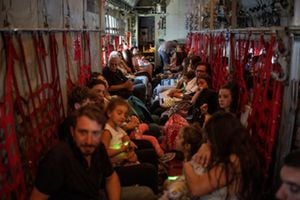
Promised a better life and financial stability, some women they found themselves plunged into a living nightmare in Lebanon.
They left their homes, their hearts full of hope, dreams carefully folded into their suitcases. Promises of a better life and financial stability called to them, whispering of streets in Beirut lined with opportunities they could never find back home.
But when they set foot on Lebanese soil, they didn’t find prosperity. Instead, they were plunged into a living nightmare they never saw coming.
Principal Secretary in the State Department for Foreign Affairs, Roseline Njogu, told the Nation that a travel ban on migration to Lebanon has been in place for over a year. Despite constant warnings, Kenyans continue to make the dangerous journey.
“We have repeatedly advised Kenyans not to seek work in Lebanon during this time. Our assessments have shown that Lebanon is not a safe destination for Kenyans because we lack a formal agreement that guarantees their rights, provides safe migration pathways, or ensures they have access to consular services,” Ms Njogu explained.
The government has advised Kenyans to postpone travel to some Middle Eastern countries, including Lebanon and Palestine, due to the ongoing conflict. Foreign Affairs Cabinet Secretary Musalia Mudavadi cautioned against travel to these regions. He said the situation in Lebanon has worsened and has impacted approximately 26,000 Kenyans currently working there.
The conflict boiled over in October 2023 when Israel was attacked by Hamas-led assailants. Israel retaliated and the conflict has spread to neighbouring territories, among them Lebanon.
Last month, Interior Principal Secretary Raymond Omollo said the country needed at least Sh2 billion to airlift 7,200 Kenyans from Lebanon.
“There are at least 24,000 Kenyans in Lebanon... Just about 7,200 have registered that they are ready to be evacuated. This will require 31 flights [that will cost] at least Sh2 billion,” he told the National Assembly’s Departmental Committee on Administration and Internal Security.
Nation.Africa spoke with two women currently living in Beirut, and their experiences are chilling.
Sharon Akinyi, 31, a caregiver
“I came here last year, filled with hope and dreams, believing that I’d finally find greener pastures. I wanted to make something of myself, to support my family, to escape the suffocating poverty back home. But now, this place has become my living nightmare.
I’ve moved houses before, searching for a place where I could be treated with even a shred of dignity.
I was with my first employer for just two weeks because the food was barely enough. I was only given tea in the morning and a small piece of bread. That was supposed to last me the entire day, sometimes even until the next day.
I moved to another house, but it was even worse. That’s when I fell into depression. I became seriously ill, and they had to operate on me. I was all alone during that time. After the surgery, they made me go back to work just two days later, even though I wasn’t okay. But I still worked, because they told me I had to repay the money they had ‘bought’ me with.
But I decided to stay here, not because it was good, but because it was better than the others. I care for two elderly people. It’s not perfect, but at least they just verbally abuse me.
At least the old man only hits me when he’s frustrated — and when I say ‘at least’, it’s because I’ve endured worse. Here, I get to eat something tangible, even if it’s only once a day.
Now, there’s a war. Every day is a new kind of terror. Bombs are falling everywhere. The air is filled with the constant sound of destruction. Just the other day, one exploded so close to our building that the entire house shook like it would collapse. I froze, my heart pounding in my chest, convinced that death had finally come for me. I’m living in constant fear, waiting for the moment everything ends. And the worst part? I don’t want to die. I can’t. I have a family waiting for me back home. I have dreams that I still cling to. But, every day, it feels like I’m losing the will to survive.
Living here is no joke, and it’s not like some of us have not gone to school; we have. But the people here see us as nobodies. I receive a salary of Sh29,000. As a caregiver I do a lot. It is a very challenging job. Since I came here, I have never bought any clothes, and I don’t leave the house. The only thing I do is throw out the trash. I don’t even buy oil, and my hair has started turning white. I’ve developed health issues since I’ve been here, and some people even sleep on the balcony.
We’re now in a place we had to flee to because of the war. I take care of two elderly people.
They gave us a link to fill out—a promise of evacuation, a way out of this nightmare. I filled it out, hoping it was my chance to escape, to return home. But since then, it’s been silence. We call the numbers they gave us, over and over again, but no one answers. No one listens. We watch as other countries evacuate their people, see the news of them leaving this war zone, and we wonder: why not us? Why have we been left behind, forgotten in this chaos? I don’t want to be here. I just want to go home, to feel safe again. My family is terrified for me. Every time I talk to them, their voices are heavy with fear, trembling as they ask if I’m okay. They cry, and I try to reassure them, but inside, I’m just as scared.
It feels like we’ve been abandoned. Like we don’t matter. Like we’re invisible to the world, to our government. Every day, we hold on to a thread of hope, but it’s slipping away, unravelling with each passing moment. And the bombs? They keep coming. When the bomb hit yesterday, I curled up, shaking, waiting for the end. I don’t want to die. I can’t die—not like this, not here, not so far from home. But the fear is swallowing me whole, and I don’t know how much longer I can endure this hell.”
Esther Njeri*, working as a house manager in Beirut
“Living in Lebanon is not easy. Every day feels like an endless battle for survival. You wake up knowing that your basic needs — things you once took for granted — are no longer guaranteed. Imagine surviving on just one meal a day; just one. By nightfall, you have a piece of dry bread and water. That’s it. In the morning, you’re handed a cup of weak tea — no food, no warmth, no comfort. Hunger becomes a constant companion, gnawing at your insides, and yet you’re forced to endure it. It’s as though they’ve already decided you’re not worthy of more, as if your existence is an inconvenience.
But it doesn’t stop there. The conflict between Israel and Hezbollah rages on, turning southern Lebanon into a living nightmare. Fear grips you every day. Trauma digs deep. I don’t sleep anymore. How can you when every sound makes you jump? I can’t eat. Every day feels like a heavy weight pressing down on me. We’ve pleaded with the agents back home for help, but they only shrug us off, sending us back to the very agents here in Lebanon who couldn’t care less.
Then there’s the discrimination. Simply because you’re a domestic worker — a ‘mjakazi’ — you are less than human in their eyes. You walk down the street and see others living their lives, but as for you, you’re invisible. They don’t even pretend to see you. Some of us are forced to sleep outside on balconies, exposed to the night’s cold. Others curl up in cramped bathrooms or over hard chairs, and many of us end up on the floor of the sitting room, bodies squeezed together, aching from exhaustion. Long before the sun rises, we are the first to wake, dragging ourselves to clean, to cook, to serve. There is no rest, no reprieve.
Coming to Lebanon was a last resort. I had searched tirelessly for a job back home. I tarmacked for what felt like an eternity. I had dreams. I went to college. But when every door remained closed, this was the only option left. The agency promised a way out — a way to work, to earn. But they never told us about the brutality, the dehumanisation. They never said that surviving would mean risking everything, even your dignity.
The treatment here is cruel. They speak without kindness. Every word laced with disdain. They look at you as if you are beneath them, as if your existence is just an inconvenience they must bear. They give you barely enough food to keep going and then act like they’re doing you a favour. And the money? It’s always delayed. Sometimes, it doesn’t come at all. When they finally hand over what you’ve earned, it feels like each coin they give pains them — as if paying you is a burden.
They don’t see us as people. In their eyes, we are not worth the respect or care that any human being deserves. We pour our hearts, our time, our lives into serving them, yet they look at us and see nothing. We’re tools, not people. And this realisation — this brutal truth — it suffocates you, until you wonder: Do they even see us at all?”









